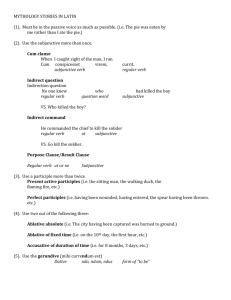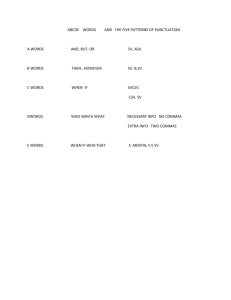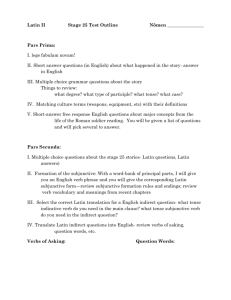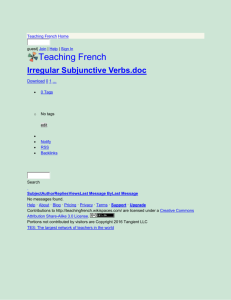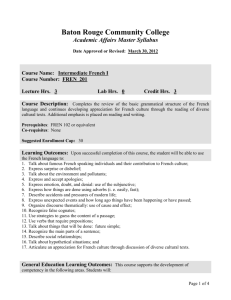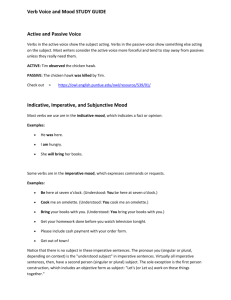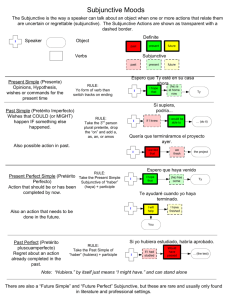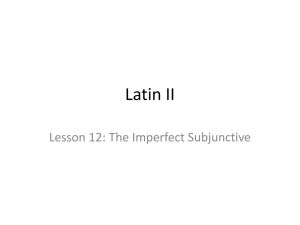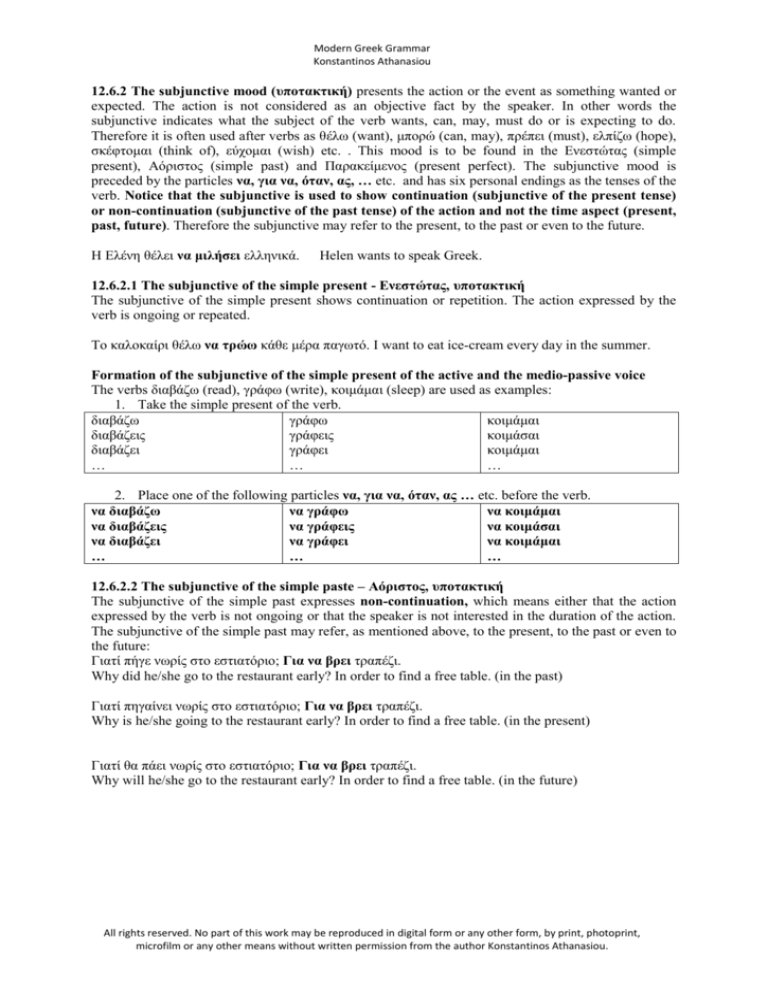
Modern Greek Grammar
Konstantinos Athanasiou
12.6.2 The subjunctive mood (σποηαθηηθή) presents the action or the event as something wanted or
expected. The action is not considered as an objective fact by the speaker. In other words the
subjunctive indicates what the subject of the verb wants, can, may, must do or is expecting to do.
Therefore it is often used after verbs as ζέιφ (want), κπορώ (can, may), πρέπεη (must), ειπίδφ (hope),
ζθέθηοκαη (think of), εύτοκαη (wish) etc. . This mood is to be found in the Ελεζηώηας (simple
present), Αόρηζηος (simple past) and Παραθείκελος (present perfect). The subjunctive mood is
preceded by the particles λα, γηα λα, όηαλ, ας, … etc. and has six personal endings as the tenses of the
verb. Notice that the subjunctive is used to show continuation (subjunctive of the present tense)
or non-continuation (subjunctive of the past tense) of the action and not the time aspect (present,
past, future). Therefore the subjunctive may refer to the present, to the past or even to the future.
Η Ειέλε ζέιεη λα κηιήζεη ειιεληθά.
Helen wants to speak Greek.
12.6.2.1 The subjunctive of the simple present - Ελεζηώηας, σποηαθηηθή
The subjunctive of the simple present shows continuation or repetition. The action expressed by the
verb is ongoing or repeated.
Το θαιοθαίρη ζέιφ λα ηρώω θάζε κέρα παγφηό. I want to eat ice-cream every day in the summer.
Formation of the subjunctive of the simple present of the active and the medio-passive voice
The verbs δηαβάδφ (read), γράθφ (write), θοηκάκαη (sleep) are used as examples:
1. Take the simple present of the verb.
δηαβάδφ
γράθφ
θοηκάκαη
δηαβάδεης
γράθεης
θοηκάζαη
δηαβάδεη
γράθεη
θοηκάκαη
…
…
…
2. Place one of the following particles λα, γηα λα, όηαλ, ας … etc. before the verb.
λα δηαβάδω
λα γράθω
λα θοηκάκαη
λα δηαβάδεης
λα γράθεης
λα θοηκάζαη
λα δηαβάδεη
λα γράθεη
λα θοηκάκαη
…
…
…
12.6.2.2 The subjunctive of the simple paste – Αόρηζηος, σποηαθηηθή
The subjunctive of the simple past expresses non-continuation, which means either that the action
expressed by the verb is not ongoing or that the speaker is not interested in the duration of the action.
The subjunctive of the simple past may refer, as mentioned above, to the present, to the past or even to
the future:
Γηαηί πήγε λφρίς ζηο εζηηαηόρηο; Γηα λα βρεη ηραπέδη.
Why did he/she go to the restaurant early? In order to find a free table. (in the past)
Γηαηί πεγαίλεη λφρίς ζηο εζηηαηόρηο; Γηα λα βρεη ηραπέδη.
Why is he/she going to the restaurant early? In order to find a free table. (in the present)
Γηαηί ζα πάεη λφρίς ζηο εζηηαηόρηο; Γηα λα βρεη ηραπέδη.
Why will he/she go to the restaurant early? In order to find a free table. (in the future)
All rights reserved. No part of this work may be reproduced in digital form or any other form, by print, photoprint,
microfilm or any other means without written permission from the author Konstantinos Athanasiou.
Modern Greek Grammar
Konstantinos Athanasiou
Formation of the subjunctive of the simple past of the active and the medio-passive voice
The verbs δηαβάδφ (read), αγαπώ (love), θοηκάκαη (sleep) are used as examples:
1. Find the past stem of the verb
δηαβάδφ - δηαβαδ- - δηαβαζ
αγαπώ - αγαπ- - αγαπεζ
θοηκάκαη - θοηκ- - θοηκεζ
2. Place the following endings:
-ω, -εης, -εη, -οσκε, -εηε, -οσλ
after the stem of the verbs of the active voice
or -ώ, -είς, -εί, -ούκε, -είηε, ούλ
after the stem of the verbs of the medio-passive voice
δηαβάζφ
αγαπήζφ
θοηκεζώ
δηαβάζεης
αγαπήζεης
θοηκεζείς
δηαβάζεη
αγαπήζεη
θοηκεζεί
…
…
…
3. Place one of the following particles λα, γηα λα, όηαλ, ας … etc. before the verb.
λα δηαβάζω
λα αγαπήζω
λα θοηκεζώ
λα δηαβάζεης
λα αγαπήζεης
λα θοηκεζείς
λα δηαβάζεη
λα αγαπήζεη
λα θοηκεζεί
…
…
…
12.6.2.3 The subjunctive of the present perfect – Παραθείκελος, σποηαθηηθή
The subjunctive of the present perfect focuses on the result of the action, for example:
Θέιφ λα έτφ ηειεηώζεη ηα καζήκαηα κοσ κέτρη αύρηο ηο κεζεκέρη. I want to have finished my
homework by tomorrow midday.
Formation of the subjunctive of the present perfect of the active and medio-passive voice
The verbs δηαβάδφ (read), γράθφ (write), θοηκάκαη (sleep) are used as examples:
1. Take the present perfect of the verb.
έτφ δηαβάζεη
έτφ γράυεη
έτφ θοηκεζεί
έτεης δηαβάζεη
έτεης γράυεη
έτεης θοηκεζεί
έτεη δηαβάζεη
έτεη γράυεη
έτεη θοηκεζεί
…
…
…
2. Place one of the following particles λα, γηα λα, όηαλ, ας … etc. before the present perfect.
λα έτφ δηαβάζεη
λα έτφ γράυεη
λα έτφ θοηκεζεί
λα έτεης δηαβάζεη
λα έτεης γράυεη
λα έτεης θοηκεζεί
λα έτεη δηαβάζεη
λα έτεη γράυεη
λα έτεη θοηκεζεί
…
…
…
All rights reserved. No part of this work may be reproduced in digital form or any other form, by print, photoprint,
microfilm or any other means without written permission from the author Konstantinos Athanasiou.

